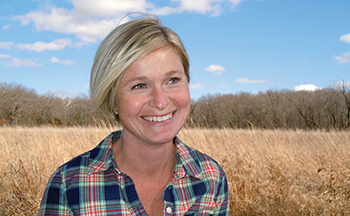Non-Hodgkin Lymphoma Survivor
Finding The Joy In Every Moment Of Every Day
 After receiving a non-Hodgkin lymphoma diagnosis in 2009, Ashley Smith decided cancer was both terrifying and liberating. Terrifying because she felt she had very little control of her destiny; liberating because she handed over the responsibility to her skilled medical team. That enabled her to focus on getting through treatment, which was made easier with the help of a strong support system and a Border Collie puppy. In Ashley’s own words, it’s hard to be sad with a puppy.
After receiving a non-Hodgkin lymphoma diagnosis in 2009, Ashley Smith decided cancer was both terrifying and liberating. Terrifying because she felt she had very little control of her destiny; liberating because she handed over the responsibility to her skilled medical team. That enabled her to focus on getting through treatment, which was made easier with the help of a strong support system and a Border Collie puppy. In Ashley’s own words, it’s hard to be sad with a puppy.
After six months of random symptoms (weight loss, night sweats and generally feeling bad) and misdiagnoses (cold, virus and anxiety), my mom stepped in. I was 31 and married but didn’t have a regular doctor, so I saw her doctor on a Monday. Within the week, I had some rather unpleasant tests and learned I had a grapefruit-sized tumor on my heart. On Friday, I received a diagnosis of primary mediastinal diffuse large B-cell lymphoma.
Hearing I had cancer was surreal. My mom’s doctor, however, was reassuring and hopeful. He was confident in the standard of care to treat this type of non-Hodgkin lymphoma. I felt more sadness than fear and worried most about how it would affect the people around me.
That Monday, I was at my first oncology appointment to discuss how to treat this tumor that was sitting on my superior vena cava. Because of its location, surgery was not an option. The plan was to start with a combination of chemotherapy and immunotherapy. If we weren’t satisfied with the results, we’d move on to radiation therapy. Then, if necessary, I’d have a stem cell transplant.
Soon after I started the drug therapy, I traveled to a hematologist oncologist a few hours away for a second opinion. Not only did he agree with my treatment plan 100 percent, he and his nurse did an excellent job of translating “cancer speak” into “person speak.” They also explained clinical trials to me, just in case I’d need to consider them. I left there feeling very informed.
Back home, I visited with a local stem cell transplant specialist — just in case. He was so knowledgeable and explained the process very thoroughly.
I trusted my medical team completely and had faith they truly had my best interests in mind. And I felt good knowing we had such a complete plan. If Plan A didn’t work, we’d move to Plan B. If that didn’t work, we had Plan C.
The side effects of drug therapy were manageable. I lost all my hair, but that didn’t bother me, maybe because I’ve always had short hair. Honestly, not fixing my hair or shaving were real time savers.
Plan A worked pretty well. Scans showed the tumor was shrinking, and we had an “end of treatment” celebration. But my follow-up scan showed something, so my oncologist recommended Plan B as an insurance policy.
Five weeks of radiation therapy to my chest was harder on my body than drug therapy. A pain patch and long, soothing baths helped most.
Food has always been a source of comfort and joy for me. Before I was diagnosed, I lost 20 pounds without trying (one clue there was something wrong). Once treatment began, my weight began to swing by 40 pounds. I gained from steroids and lost when an ulcer in my esophagus due to radiation therapy forced me to be on a liquid diet. Bottom line, when I was able to eat, I ate what I loved: donuts and smoothies (the good kinds).
The radiation therapy accomplished what we’d hoped for, so I didn’t need Plan C. I was incredibly relieved to be cancer-free. I was ready to get back to being a productive member of society, but it also felt a little weird. I’d been consumed with treatments and scans and waiting. Aside from follow-up appointments for the next two years, it was over.
At that time, my oncologist did a wonderful thing. He referred me to a new primary care physician. He chose her because he felt she would understand where I was psychologically. She was the perfect mix of a doctor who listened, took me seriously and humored me when I thought I might have new symptoms. She calmed my fears. She explained many things, especially those first few years, about side effects and late effects. She always treated me exactly the way I needed to be treated. More than 10 years later, she is still my doctor.
Having cancer changed me immeasurably. I am happy about many things (donuts, coffee and my husband). Even more than that, I work daily at finding joy. It’s a mindset that allows me to experience all that this amazing life has to offer, both good and bad alike.
2 things I wish I’d done...
- Realized that my reaction to my cancer and treatments would not be exactly like anyone else’s. It depends on so many factors. Specifically, I could have saved myself a lot of anxiety about how I would react to chemotherapy.
- Journaled more, about the tests I had; people I worked with; my reactions to treatments; how I felt physically, mentally and emotionally; and the amazing things my friends did to support me. It was all so important in the moment, and much of it is a blur now.


